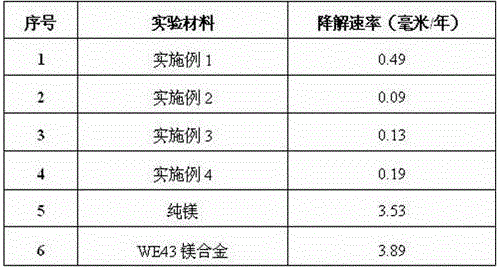A human-degradable, corrosion-resistant, high-strength-tough Zn‐Fe‐X zinc alloy and its application
A zinc alloy and corrosion-resistant technology, which is applied in the field of corrosion-resistant, high-strength and tough Zn-Fe-X zinc alloys, can solve the problems of inability to provide mechanical support time, low plasticity of zinc alloy materials, and uncontrollable degradation rate, etc. Controllable, fine grain, good strength and toughness
- Summary
- Abstract
- Description
- Claims
- Application Information
AI Technical Summary
Problems solved by technology
Method used
Image
Examples
Embodiment 1
[0023] A human body degradable corrosion-resistant high-strength Zn-Fe-X zinc alloy of the present invention has the following element composition and mass percentage: Zn 90%, Fe 9.92%, Sr 0.08%.
Embodiment 2
[0025] A human body degradable corrosion-resistant high-strength Zn-Fe-X zinc alloy of the present invention has the following element composition and mass percentage: Zn 99.997%, Fe 0.002%, Ca 0.001%.
Embodiment 3
[0027] A human body degradable corrosion-resistant high-strength Zn-Fe-X zinc alloy of the present invention has the following element composition and mass percentage: Zn 99.975%, Fe 0.01%, Mg 0.015%.
PUM
| Property | Measurement | Unit |
|---|---|---|
| yield strength | aaaaa | aaaaa |
| elongation at break | aaaaa | aaaaa |
Abstract
Description
Claims
Application Information
 Login to View More
Login to View More - R&D Engineer
- R&D Manager
- IP Professional
- Industry Leading Data Capabilities
- Powerful AI technology
- Patent DNA Extraction
Browse by: Latest US Patents, China's latest patents, Technical Efficacy Thesaurus, Application Domain, Technology Topic, Popular Technical Reports.
© 2024 PatSnap. All rights reserved.Legal|Privacy policy|Modern Slavery Act Transparency Statement|Sitemap|About US| Contact US: help@patsnap.com










